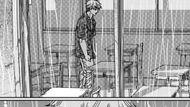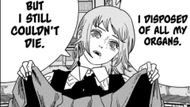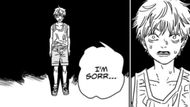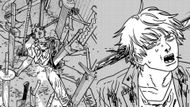Chainsaw Man has always walked a razor’s edge between raw emotional honesty and chaotic absurdity. Chapter 211 is no exception, and in true Tatsuki Fujimoto fashion, it manages to deliver both in a single scene. Denji, our often unpredictable protagonist, finds himself face-to-face with the Death Devil, or as she’s been dubbed in the official English release, Lil’ D.
She tells him an apocalyptic truth and warns him about a plan that could shatter the world. She literally shows him physical proof of her devil nature. And yet, Denji ignores all of it and agrees to help her for one very specific, very on-brand reason, pulling out a bold move.
For longtime readers of Chainsaw Man, this moment landed somewhere between “of course Denji would do this” and “wait, hasn’t he grown past this?” That’s where the real debate begins. Is this just another example of Fujimoto’s comedic timing, or is it the unraveling of all the character growth Denji has shown since the start of Part Two?

To understand why this scene matters so much, we need to revisit the broader stakes of Chainsaw Man: Part Two. At the heart of Yoru’s scheme is Denji himself. As Chainsaw Man, he possesses the terrifying ability to erase concepts from existence. Yoru’s ultimate goal is to use that power to remove death itself, plunging the world into an endless state of war.
This is the context in which Lil’ D approaches Denji. She warns him of the danger. She tries to convince him to trust her. And then, she goes for a very diverse strategy. Although it isn't confirmed if it was calculated or spur of the moment.
Recap of Chainsaw Man chapter 211

Chainsaw Man chapter 211 begins with Denji waking up in a classroom, having been carried there by Lil’ D and Famine (Fammy). There’s a certain offbeat charm to the setup, Fammy dozing peacefully on the floor, Lil’ D just waiting for him to regain consciousness.
When he does, Lil’ D in Chainsaw Man finally introduces herself properly as the Death Devil. Denji’s reaction? Skeptical at best. He doesn’t take her seriously, despite her devilish eyes and matter-of-fact demeanor. In true Denji fashion, he’s suspicious, but not for the right reasons.
Then, Mirosugo (the returning Swordman hybrid) tells Lil’ D to show Denji her stomach to prove her nature. This is where Fujimoto flips the scene on its head. Instead of focusing on the gaping wound in her torso, as it is literal proof that she’s not human, Denji zeroes in on something entirely different.
And just like that, his decision is made. He’ll help her. Not because of the catastrophic threat to the world. Not because of her honesty. But because, in his mind, she’s “worth helping” after that moment.
It’s an absurd beat, a hard pivot from tense devil politics to the kind of crude impulse that defined Denji in Chainsaw Man: Part One. But is that necessarily a bad thing for the story?
Is it really the “End” of his development?

To call this moment the end of Denji’s development is, perhaps, an overreaction. Yes, it’s a choice motivated by impulse rather than principle. Yes, it undercuts some of the maturity he’s shown in moments like his care for Nayuta or his tentative partnership with Asa.
But Denji’s arc in Chainsaw Man has never been about becoming a perfect hero. His victories, when they come, are often small and personal. His setbacks can be huge and humiliating. This is part of his pattern: take a step forward, then stumble two steps back, only to eventually claw his way forward again.
If anything, this moment might be a setup for later growth. By making a choice for such a ridiculous reason, Denji could find himself in even deeper trouble that forces him to confront not just Lil’ D’s warning, but his own tendency to self-sabotage.
The Fujimoto pattern: Human flaws as story engines

What’s worth remembering is that Fujimoto doesn’t write “flawless” heroes. His protagonists make bad calls. They let personal bias override reason. They chase selfish desires even when the stakes are high.
That’s why moments like this, absurd as they are, don’t necessarily break the story. They are the story. Denji’s lack of discipline in Chainsaw Man is both his greatest weakness and one of the main engines driving Chainsaw Man forward. If he always made the “right” choice, we’d lose the unpredictable, volatile energy that makes the series so distinct.
